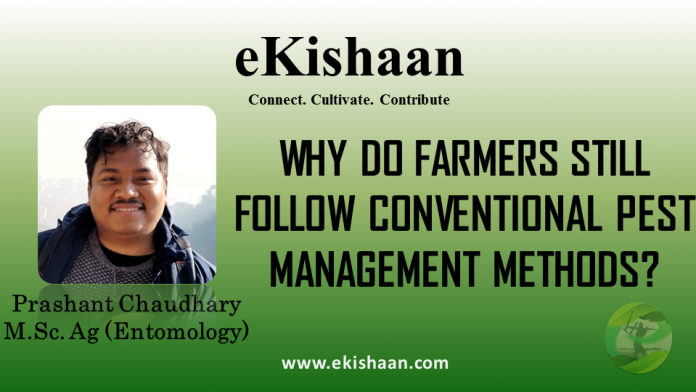WHY DO FARMERS STILL FOLLOW CONVENTIONAL PEST MANAGEMENT METHODS?
Conventional pest management refers to the use of synthetic pesticides against pests. It is the old school of pest management. It has its perks and its own drawbacks.
Perks include:
- high efficiency initially,
- easy to handle,
- readily available and
- trust built over years of usage.
Drawbacks include:
- continuous reduction in efficiency with every season,
- destruction of natural enemies of pests,
- health hazards on consumers,
- development of pesticide resistance,
- pest resurgence,
- pollution of environment (Biomagnification and Bioaccumulation) and
- long persistence in the environment.
As we can see, the drawbacks of using conventional pest management overwhelms its perks. And, it is not just about the quantity but the immense quality. The percentage gain in yield this method brings is less than the overall health cost over the environment. All this negativity around synthetic pesticides hasn’t changed the usage trend yet. Farmers continue using harmful pesticides.
It is scientifically proven that conventional pesticides usage has been destroying the delicate balance in the ecosystem. Scientists have studied it, verified it and conveyed the information. Schools teach this valuable information. The concerned authority trains the farmers in the alternative pest management methods. Hence, farmers are surely aware of the bad impacts of their practices. However, they rely on the same practices.
Farmers raise their fields as any human raises his or her child. Farmers till the land with their mere effort. They work against the weight of soil in any range of temperature. They sow the seeds with love and hope. They weed out any unwanted plant manually or by force using herbicides. They want their land clean. As soon as they see any pest, they apply pesticides high in dosage and concentration, sometimes higher than the recommendation. Farmers can not watch their precious livelihood get destroyed by unwanted beings. Many farmers apply protective pesticides even before any detection of pests.
When researchers claim that alternative methods would give them results, the farmers do not believe the claims. The proposed botanical extracts are regarded as ineffective by the farmers. Since the start of the agricultural revolution, farmers have been using botanical extracts in pest management. Vedic scriptures have the pesticidal properties of various wild herbs mentioned in them. Present farming community is well aware of the usage of such sources. However, the continued failure of such methods have defamed the natural pesticides. This failure is also by the grace of extreme usage of synthetic pesticides resulting in pesticide resistance and consequential failure of botanicals. That is why, when scientists propose botanicals, farmers do not see any value in them.
There is a principle in agriculture extension stating “Seeing is believing”. We believe what we can see with our own eyes. This is the very principle upon which illusions are possible and ‘magician’ is a profession. Extension of the noble pest control method is possible only if the state could showcase these methods in action. The farmers need self verification with no financial loss. If they observe the success of such model farms applying eco-friendly measures, they would surely adapt the methods proposed. If not, not a single farmer would believe these so-called “baseless” effective methods.
After the emergence of issues related to the health hazards of toxic pesticides, the whole world has been preaching on the use of alternate pesticides. Researchers have been leaning towards alternate paths. However, we cannot deny the irresistibility of using synthetic pesticides. We can all agree that organic ways of managing our fields are eco-friendly, however, it does not ensure the immediate satiety of the weight of hungry stomachs.
Researchers have been recommending different types of biopesticides, hormones and physio-mechanical measures to control the encroachment of pests into our fields. In contrast to that, the use of hazardous pesticides keep rising in proportion to the increasing food demand. As the food insecurity increases, the emergency of immediate pest control becomes critical. This is where the arguments of eco-friendly advocates lose.
What farmers require and believe in is immediate remedy from the pests. The study by PMRD (2014) shows the majority of pesticides being used to be synthetic and harmful pesticides. Out of 1625.9 MT of total pesticides, only 0.63 MT of biopesticides had been used in 2014. This alone shows the incapability of biopesticides to penetrate the conventional farming methods at the grass root level. We see so many projects from international agencies focused on organic agriculture. However, the achievements are puny and negligible when observed at a grand scheme.
Even the research institutes are unable to keep up with the demand of biopesticides. To date, what our research institutes have been doing is studying entomopathogenic microbes and we are stuck right there at this extension step. Our studies are just for publication purposes with no use at farmer level. Even useful strains of microbes are unavailable to the general farmers. Woke farmers in search of good quality biopesticides are unable to get what they seek in required quantities. This infers that there is something very wrong with the approach our institutions have been taking to solve the pesticide issue. We have become more of academics and less of agriculturists when the roles should have been reversed.
Nepal has been importing pesticides since the 1950s. We had a well-developed pesticide production and management system back in 1977, when there was Nepal Pesticide and Chemical Industries Pvt. Ltd. (NEPCIL), Kapilvastu. In an ideal world where related authorities would help each other grow to push the economy, the Nepalese system came out as different. In 1995, Agriculture Input Company (AIC) stopped the bulk purchase of local produce when it was the major client to NEPCIL. This decreased the turnover of NEPCIL that led to its closure. This closure was the beginning of private dealerships in pesticide marketing. In a country where nothing is untouched from political influence, we cannot be sure if this was not a political move for personal gain.
Pesticides had worked miracles in the past; however, it was too good to have been sustainable. In addition, this is exactly how everything went down. Unsustainable pest control has resulted in elimination of natural enemies, unhealthy levels of pesticide residues in food, chronic health problems and not so thriving agriculture.
We have an insufficient number of technical workforce. The concerned authority clearly knows about this and yet decides not to hire more of such resources. The government authorities have done a brilliant job in forming proper legal measures to mitigate the hazards of pesticides; however, we lack efficient implementation. The government needs to understand that the laws and policies will not be implemented on their own. The country needs young blood to implement it.
On one hand, there is the influence of synthetic pesticide manufacturers on the policy makers. On the other hand, various agencies have been funding the promotion of organic and natural pest control. Pesticide regulation authority has banned about 24 specific pesticides and their formulations; however, we may still find hazardous banned pesticides in the local market. In addition, such sellers and their syndicate remain untouched. What kind of laws are we forming if we cannot even execute them as such? This is the fundamental question. We have replicated various research from other regions and tested various biopesticides but we remain incapable of providing our farmers with the available technology.

